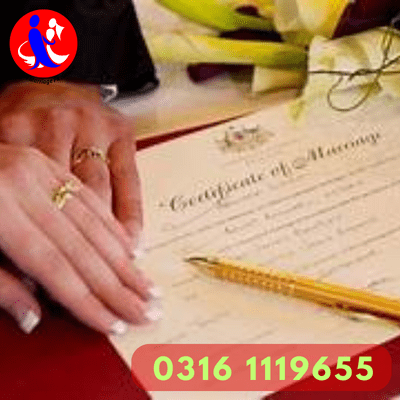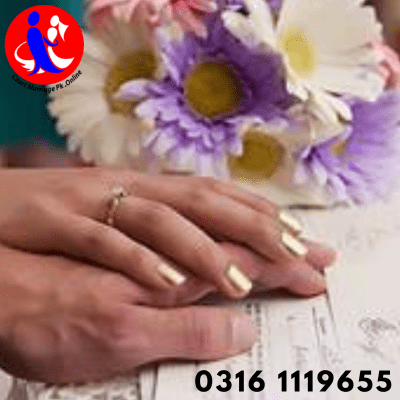Karachi Office
- M-51, Muneer Mobile Mall, Block 17, Near Perfume Chowk & Jauhar Chowrangi, Gulistan-e-Jauhar.
- info@courtmarriagepk.com
- +92 316-6644789
Marriage is a sacred bond that unites two individuals in love and commitment. In Pakistan, as in many other countries, marriages can be solemnized through various cultural and religious ceremonies. However, many couples opt for a registered marriage to ensure legal recognition and access to various rights and privileges. In this comprehensive guide, we will explore the significance of registered marriage in Pakistan, the process involved, its benefits, and everything you need to know about making your marital union official.
In Pakistan, marriage is a cultural cornerstone and a significant legal commitment. While traditional ceremonies hold deep sentimental value, many couples in Pakistan choose to solidify their unions through a legally binding process known as a “Registered Marriage.”
A Registered Marriage in Pakistan is a legally recognized union between two individuals. It is a process that involves formal documentation with the government and issuing a Marriage Certificate. Unlike traditional ceremonies, a registered marriage is a legal contract, providing several substantial advantages to couples.
The legal framework for registered marriages in Pakistan varies based on religious affiliations. The Muslim Family Laws Ordinance 1961 applies to Muslim couples, while Christian couples follow the Christian Marriage Act of 1872. These laws ensure the legal validity of the marriage and establish the spouses’ rights and responsibilities.

Registering your marriage in Pakistan involves a structured process that ensures the legal validity of your union. This chapter will provide a comprehensive step-by-step guide on writing your wedding, emphasizing the importance of a “Registered Marriage.”
The first crucial step towards a registered marriage is to obtain a Marriage License. You can obtain this license from your area’s local Union Council office. The Union Council is responsible for overseeing and facilitating the marriage registration process.
Both parties involved in the Registered Marriage must provide the necessary documents to support the registration. These documents typically include,
You must have witnesses present during the registration process for a Registered Marriage. These witnesses should not be blood relatives of either spouse. Typically, two witnesses must sign the marriage certificate to confirm the Registered Marriage’s authenticity.
You must complete a marriage registration form for a Registered Marriage, which the Union Council provides. Ensure that all the details in the form are accurate and complete.
Both parties in a Registered Marriage will be asked to take an oath affirming their consent and willingness to enter the marriage. This oath is a crucial legal step in the Registered Marriage process.
Once all the formalities are complete, you will be issued a Marriage Certificate. This certificate is legal proof of your registered marriage and is valuable for various purposes.
The time it takes to complete the registration process for a Registered Marriage can vary depending on your location and the efficiency of the local Union Council office. Typically, it may take a few weeks to receive your Marriage Certificate.
Regarding costs, there are usually nominal fees associated with the registration process. The exact fees can vary from one Union Council to another, so it’s essential to inquire about the specific costs at your local office.



The comparative analysis between a “Registered Marriage” and an “Unregistered Marriage” in Pakistan. By examining the differences and similarities, we aim to provide you with a clear understanding of the advantages and disadvantages of each.
Legal Recognition and Protection
A registered marriage in Pakistan is a legally recognized union, offering the couple legal protection and access to various rights and benefits.
It provides a solid legal foundation, ensuring that both spouses have rights in case of disputes or separation.
Social Acceptance and Cultural Significance
Registered marriages are universally accepted and respected, reflecting legal compliance and cultural significance.
They carry social prestige and are celebrated in diverse communities.
Child Custody and Support
A registered marriage ensures defined guidelines for child custody and support, prioritizing children’s welfare.
Legal provisions safeguard the rights of any children born or adopted during the marriage.
Immigration Benefits
For couples with one foreign national spouse, a registered marriage can simplify immigration processes and facilitate family reunification.
Simplified Legal Proceedings
In the unfortunate event of disputes, separation, or divorce, a registered marriage simplifies legal proceedings, reducing complexity and costs.
An unregistered marriage needs more legal recognition from a registered one, potentially leaving spouses with fewer legal protections.
In case of disputes, it may be challenging to prove the existence and terms of the marriage.
Financial planning and inheritance can be more complicated in an unregistered marriage, as it may need more legal framework provided by a registered union.
While unregistered marriages can hold cultural significance, they may not enjoy the same universal social acceptance as registered marriages.
Determining child custody and support in unregistered marriages can be complex and may not have the same legal clarity as in registered marriages.
Unregistered marriages may pose challenges in immigration matters, making it more difficult for foreign spouses to join their partners in Pakistan.
Resolving disputes or separation in an unregistered marriage may involve more complex legal procedures and potentially higher costs.

Myths About Registered Marriages
Misconception 1: Registered Marriages are Only for Legal Purposes
Reality: While it’s true that a registered marriage holds legal significance, it is not merely a legal formality. It combines the legal aspects with cultural and social recognition, making it a comprehensive choice for couples.
Misconception 2: Registered Marriages are Expensive
Reality: The costs associated with a registered marriage are typically nominal and vary from one Union Council to another. These costs are a small investment in securing your legal rights and privileges.
Misconception 3: Unregistered Marriages are Equally Valid
Reality: While cultural and religious ceremonies hold immense significance, an unregistered marriage needs the legal recognition and protections a registered marriage offers. In the eyes of the law, only registered marriages are legally binding.
Misconception 4: Registered Marriages are Only for Specific Communities
Reality: Registered marriages are open to all communities and are not limited to any specific group or ethnicity. They are universally accepted and recognized across Pakistan.
Misconception 5: Registered Marriages Lead to Increased Bureaucracy
Reality: While some paperwork is involved in the registration process, it is not excessively bureaucratic. The documentation ensures transparency and legal clarity, ultimately simplifying legal proceedings if needed in the future.
Misconception 6: Registered Marriages Lack Cultural Significance
Reality: A registered marriage can still be celebrated with all the cultural and religious traditions that hold significance for the couple and their families. It combines the best of both worlds, providing legal and cultural recognition.
While filled with numerous benefits, the path to a registered marriage in Pakistan may also present specific challenges. In this chapter, we will explore these challenges and offer guidance on how to navigate them effectively.
Challenge: Gathering the required documentation, such as CNICs, photographs, and affidavits, can be challenging, especially if certain documents need to be included or updated.
Solution: Carefully review the document requirements and ensure all necessary paperwork is in order before initiating the registration process. Keep copies of essential documents as a backup.
Challenge: Balancing cultural and family expectations with the desire for a registered marriage can be tricky, as some family members may prefer traditional ceremonies.
Solution: Open communication with family members is critical. Explain the legal advantages and the significance of a registered marriage to gain their support and understanding.
Challenge: The registration process may vary slightly from one region or Union Council to another, leading to confusion.
Solution: Research and understand the specific requirements and procedures of your local Union Council to ensure a smooth registration process.
Challenge: Some couples may find the legal aspects of a registered marriage complex or overwhelming.
Solution: Seek legal advice if needed, and don’t hesitate to ask questions at the Union Council to ensure a clear understanding of the process.
Challenge: Societal pressures to conform to traditional norms may create tension or reluctance in pursuing a registered marriage.
Solution: Stay firm in your decision, emphasizing the legal and financial advantages. Encourage open dialogue with family and friends to address their concerns.
Challenge: Misinformation or misconceptions about registered marriages can create confusion.
Solution: Refer to reliable sources, seek guidance from legal experts or Union Council officials, and consider the information provided in this guide to clarify doubts.
In this chapter, we will answer common questions that individuals and couples often have when considering a “Registered Marriage” in Pakistan. We hope to offer clarity and guidance on various aspects of the process.
In Pakistan, a registered marriage is not just a legal formality; it’s a significant step that ensures your rights and secures your family’s future. By understanding the process and benefits, you can make an informed decision that aligns with your aspirations and values. Whether for legal recognition, financial security, or safeguarding your family’s rights, a registered marriage is a vital and valuable choice.
WhatsApp us